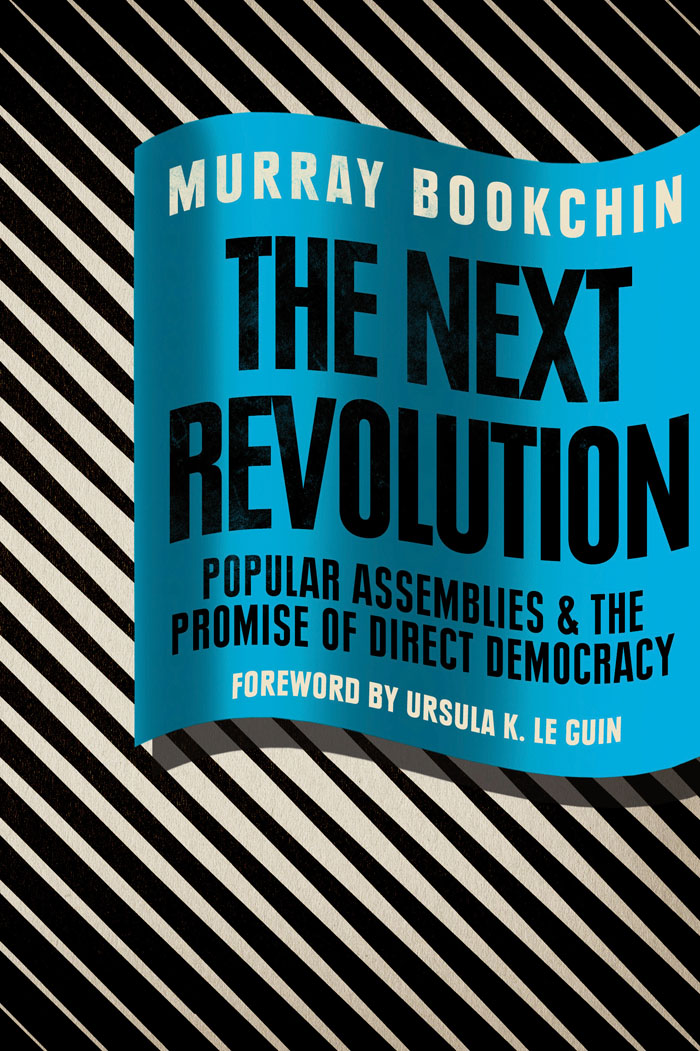Over 30 years of anarchist writing from Ireland listed under hundreds of topics
Murray Bookchin - The Next Revolution (Review)
 Despite being a pathbreaking figure from the 1960s onward in anarchist, green, and directly democratic political circles having predicted early on the significance of ecological issues and technology to leftwing social struggles Murray Bookchin today remains unknown to many on the left, and to those who do know of him he remains controversial.
Despite being a pathbreaking figure from the 1960s onward in anarchist, green, and directly democratic political circles having predicted early on the significance of ecological issues and technology to leftwing social struggles Murray Bookchin today remains unknown to many on the left, and to those who do know of him he remains controversial.
Disliked by class struggle anarchists and Marxists for his advocacy of community organising over workplace organising, and by anarchists involved in single issue activism for their lack of organisation and supposed concern with personal rebellion over social change, he made quite a few enemies in his last days for fiery polemics directed at his intellectual opponents. While his supporters in organisations like New Compass defend him for his consistency, others argue that he ended up alienating potential allies by refusing to ever waver on his specific revolutionary vision: focused on creating a municipal confederation of ecological communities practicing direct democracy, founded on a philosophy of science, reason, and humanism.
This new collection of essays from the last few years of his life may provide a useful entry point of his philosophical and political project called social ecology and generate further debate for the future of libertarian socialist organising in an age of increasing militarism and climate crisis.
New wine or new bottle?
The first essay, The Communalist Project, has been published before and is by far the weakest. Written after Bookchin had distanced himself from anarchism, it is replete with historical distortions and errors about anarchist theory and practice which Bookchin himself attacked Marxists for making in the 1960s. It comes across as a disingenuous rewriting of his former philosophy, knocking down straw-man after straw-man in an attempt to boost his own new political project called Communalism.
One could argue that Bookchin in fact never really left the social anarchist tradition, merely felt the need to distance himself from a label he saw as being irredeemable due to its increasing associations with primitivists, postmodernists, and lifestylists. From his own descriptions, Communalism could be viewed as a revamped version of anarcho-communism in that it seeks a community directed economy instead of the worker directed economy desired by most anarcho-syndicalists.
Ecology and the future of the left
Most of the other essays cover familiar topics of interest, from the importance of ecology and the urban environment to political organising (years before Autonomist Marxists like Hardt and Negri), the crucial need to root one’s ideas in Enlightenment humanism over what he saw as the irrationality of postmodernism, critiques of nationalism, and the potential of popular assemblies as organs of a new participatory democracy.
The final essay, The Future of the Left, is from a contemporary perspective the most interesting. Bookchin gives a broad overview of revolutionary left traditions of the past, offering critical commentary of what went right and wrong with anarchism, Marxism, and other revolutionary doctrines. He stresses the importance of reason, Enlightenment humanism, direct democracy, and the ecological worldview, while attacking the traditional left’s excessive focus on class and economic issues, pointing out the need to appeal to people simply as “the people”, instead of “workers”, which he finds reduces them to their economic function and discounts the significance of trans-class power hierarchies that cannot be reduced economics.
A matter of emphasis
It’s difficult to say what he would have made of the recent Occupy and Squares movements that kicked off in 2011. His comments about the flaws of the alter-globalisation protests indicate he would have criticised their focus on consensus decision making over majority voting and their lack of a coherent program and systematic body of ideas. Though he would likely have praised the attempts to get people involved in grassroots democracy, unify class and tras-class forms of social struggle, and bring environmental issues to the forefront of political discussion.
Looking at the collection a a whole, Bookchin perhaps under emphasised the role of class and workplace organising in social struggle, but no more so than Marxists and class struggle anarchists have overemphasised it, often relegating issues like race, gender, sexuality, and ecology to secondary importance; issues that can be sorted out "after the revolution". Whether traditional class struggle against capital and the state is indeed inferior to Bookchin’s form of community struggle against all forms of hierarchy and domination is an open question, and one that deserves consideration.
Given the impact social ecology has had on the recent Rojava Revolution, this collection can act as a compelling gateway to a thinker whose ideas could provide valuable lessons for future anti-authoritarian theory and practice.
WORDS: EOIN O’CONNOR
This article is from issue 11 of the Irish Anarchist Review

